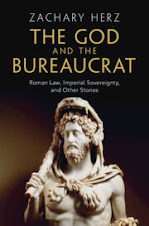Zachary Herz, University of Colorado, Boulder, has published The God and the Bureaucrat
Roman Law, Imperial Sovereignty, and Other Stories (Cambridge University Press):
Why is Roman law so boring? In this book, Zachary Herz argues that the bureaucratic, positivistic world of Roman law is not a distraction from the violent autocracy of the Roman empire, but an imagined escape. Lawyers, bureaucrats, and even emperors used legal writing to think about worlds that were safer or fairer than the one in which they lived. This archive of political imagination slowly became a law-code, and now guides readers through a legal system about which its authors could only dream. From Augustus to Justinian, this book shows how law symbolized order in chaotic times, and how that symbol eventually took on a life of its own. From the enlightened judgements of Hadrian to the great jurists and child rulers of Severan Rome, Herz reveals what Romans were really talking about when they talked about law.
--Dan Ernst. TOC after the jump.
Introduction: Did Romans Have Law?
Part I - Nevertheless, We Live According to the Laws
1 - Augustus and the Birth of Imperial Legality
2 - The Emperors Who Obeyed the Law: Vespasian, Titus, Trajan
3 - Letters from a God: Hadrian and the Rescript System
Part II - Law without Order
4 - Inheritance, Authority, and Alexander
5 - Juristic Reasoning, Citational Practices, and Law at the End of an Empire
Part III - New Rules
6 - Towards Late-Antique Legalities
7 - The Embodiment of the Civil Law
Conclusion: What We Talk About When We Talk About Roman Law
